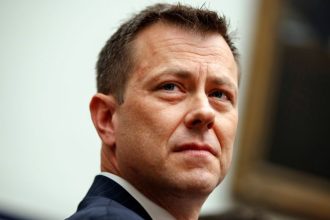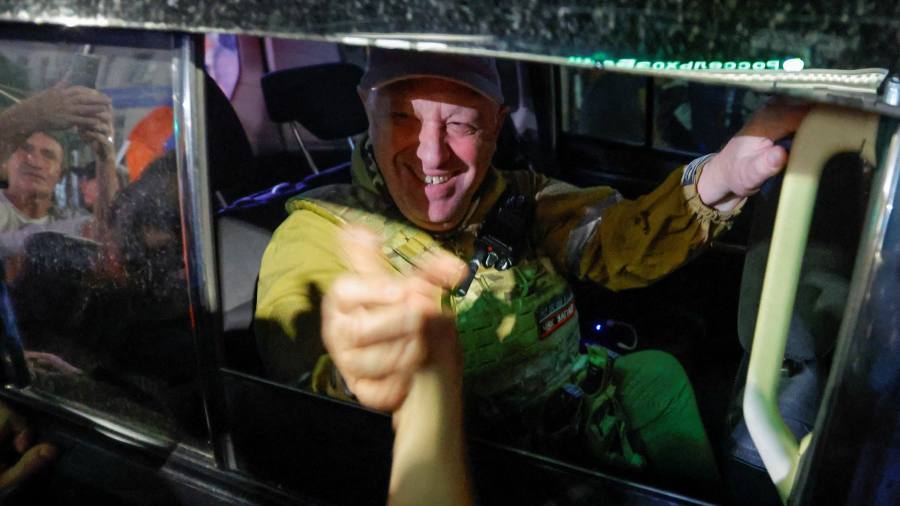Receive free War in Ukraine updates
We’ll send you a myFT Daily Digest email rounding up the latest War in Ukraine news every morning.
The writer is senior fellow at the Carnegie Russia Eurasia Center, Berlin and visiting fellow at the European University Institute, Florence
Vladimir Putin appears to have overcome his biggest domestic crisis since the Chechen war with which his reign began. But the Russian president’s allies at home and abroad are not rushing to congratulate him. The mood among the elite and the tone of official propaganda are far from triumphant. The very possibility of a coup after 23 years of rule, and in the second year of the Ukraine war — a campaign supposed to cover Putin and his regime in glory — puts his grip on Russia into question. It also challenges the idea of unanimous support from a patriotic majority.
Wagner military group leader Yevgeny Prigozhin’s seizure of Rostov-on-Don, one of Russia’s largest cities, and their rapid advance to within 200km of Moscow painted a startling picture of the powerlessness of the authorities, even if partly explained by a desire to avoid bloodshed. Some residents of Rostov even handed flowers to the mutineers of the private military company. The people of a country taught by state propaganda that there is no greater betrayal than “colour revolutions” re-enacted the symbolic gesture typical of such uprisings.
Prigozhin’s uprising was rooted in the disruption of an internal balance that Putin had kept for years, but which began to crumble after the stuttering invasion of Ukraine. Many Russian citizens refuse to acknowledge their country’s weakness. They blame defeats in Ukraine on indecision and betrayal at the top. Failures at the front have brought demands for enhanced militarisation of the economy and purges of the elite. Prigozhin’s vision for Russia went still further: a giant North Korea with the population and economy at full mobilisation, at least until victory.
Before the invasion, Prigozhin’s role in the Russian system was that of a service provider. With Wagner and his troll factory, the former convict was doing Putin a favour by engaging in tasks that the state was reluctant to take on in its own name: intimidating domestic enemies, interfering in foreign elections and fighting in Africa. As a result, an increasingly ambitious non-state entity with state functions emerged.
With Russia’s full-scale invasion of Ukraine and Wagner’s weighty contribution to the war, Prigozhin’s function changed. He conducted public campaigns marked by provocative statements on domestic and foreign policy. His calls to punish the state apparatus and mobilise private business earned him much support in a short space of time.
Prigozhin chose to cross the line after June 10, when defence minister Sergei Shoigu issued an order to subordinate “volunteer” fighting formations to his ministry. This threatened Prigozhin with the loss of his main power asset to Russia’s official armed forces. However, he did not challenge Putin directly — for good reason. During two decades of power, Putin has merged with the Russian state in the population’s eyes to such an extent that, for many, going against him would be tantamount to an attack on Russia itself.
Prigozhin’s goal seems to have been not to overthrow but to partly replace the ruler. Removing Shoigu would have allowed Prigozhin to demonstrate his importance not only as a mercenary commander but as a politically influential figure. Prigozhin’s attack on Shoigu, whose military successes in Crimea and Syria made him the regime’s second-most popular figure after Putin, was an attempt to secure that position for himself.
Putin has avoided the worst-case scenario: civil war-style clashes between “patriots”, bloodshed and the shelling of cities by the army. The state apparatus, especially in Russia’s regions, demonstrated at least passive loyalty. But all this came at the cost of tremendous stress to the system. Prigozhin’s actions have put the pro-war camp, which greatly respected him, in a difficult position. Accusations of betrayal so often levelled at opponents of the war can now be thrown at some of its supporters. The official dividing line between “good” and “bad” Russians, or “patriots” and “traitors”, is no longer clear.
Russia’s “patriotic majority” has always suspected the country’s affluent rulers and private business elites of being indifferent to national interests and ordinary people. This was precisely Prigozhin’s claim, and it will continue to have resonance despite his apparent sidelining.
Putin will have to either continue to act in the precarious role of protector of the “corrupted elite” or, under pressure from the events of last weekend, embark on a purge of that elite. In this sense Prigozhin’s adventure may spell the end not only of the current form of Putin’s regime, but with it, the entire legacy of post-Soviet Russia.
Read the full article here




